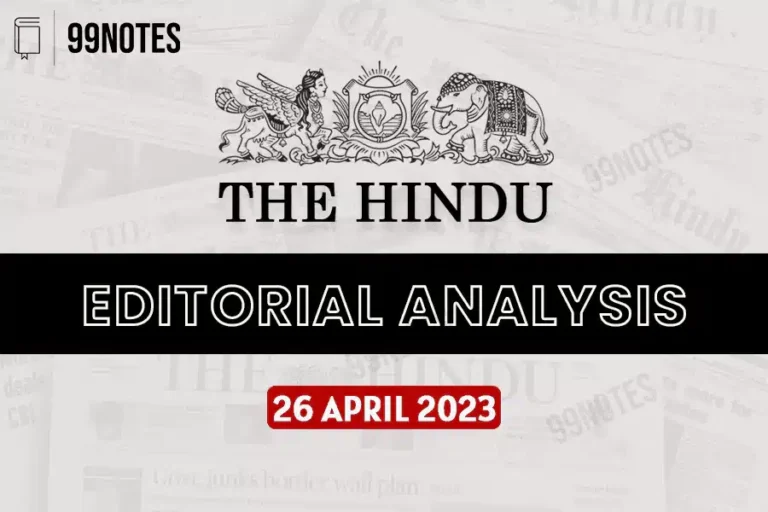4 April 2024 : The Hindu Editorial Notes PDF
The Hindu EDITORIAL
4-April-2024
1. Turning the spotlight on the urban poor.
|
Topic: GS2 – Social Justice – Vulnerable sections. Critical for UPSC to analyse urban poverty, employment dynamics, migration trends, and gender disparities for socioeconomic policy formulation. |
| Context |
| ● The article discusses employment and income trends in Indian slums, contrasting rural-urban migration, gender dynamics, and economic challenges faced by the urban poor. |
Introduction:
- The India Employment Report (IER) 2024, conducted by the Institute for Human Development and International Labour Organization, delves into the dynamics of employment and income trends in India.
Trickle-down Effect and Divergent Trends:
- IER questions the trickle-down effect amidst a 5.4% average real economic growth from 2015-16 to 2022-23.
- Rural-urban divergence observed in employment and income trends, with urban areas facing higher unemployment rates but offering higher wages.
Employment Trends in Slums:
- Survey conducted in Kolkata’s slums reveals stable occupations, with unskilled labour being predominant.
- Trends indicate a shift towards petty businesses and construction work, with a decline in skilled labour employment.
Income Trends:
- Average monthly income decreased by 5% at constant prices in 2019 compared to 2012.
- Decline in real income observed across various occupations, including government service and petty businesses.
Gender Composition and Casual Work:
- Percentage of women in the workforce declined by 3% in slums, contrasting with the IER’s national data showing a 1.6% increase.
- Rise in casual work, particularly labour, attributed to increasing wages, though lacking social security.
Urban Poverty and Economic Mobility:
- Despite higher urban income, deeper poverty observed due to declining income and inequality.
- Lack of public support for access to cheap food and gainful employment exacerbates urban poverty.
Policy Recommendations:
- Emphasis on rural non-farm sectors and public support for urban poverty alleviation is crucial.
- Need for addressing inequalities and ensuring quality employment opportunities for sustainable economic mobility.
Conclusion:
- Urban income disparity highlights challenges in economic mobility and quality of work for the urban poor, necessitating comprehensive policy interventions.
| Urban poverty in India: |
|
Reasons for Urban Poverty: ● Rapid urbanization leading to a surge in population density in urban areas. ● Lack of affordable housing options, forcing people into slums and informal settlements. ● Limited access to basic services like healthcare, education, and sanitation. ● Structural unemployment due to mismatched skills and job opportunities. ● Exploitative labour practices and low wages in the informal sector. ● Inadequate social protection measures for vulnerable urban populations. Way Forward to Tackle Urban Poverty: ● Implement policies for inclusive urban development focusing on equitable access to basic services and infrastructure. ● Promote affordable housing schemes and slum redevelopment programs to improve living conditions. ● Invest in skill development and vocational training to enhance employability and create decent job opportunities. ● Strengthen social safety nets such as food security programs, healthcare subsidies, and unemployment benefits. ● Foster partnerships between government, civil society, and private sector for sustainable urban poverty alleviation initiatives. ● Address gender disparities and empower marginalised communities through targeted interventions. ● Encourage community participation and grassroots initiatives for holistic urban poverty eradication. |
| PYQ: Despite implementation of various programmes for eradication of poverty by the government in India, poverty is still existing.’ Explain by giving reasons. (150 words/10m) (UPSC CSE (M) GS-1 2018) |
| Practice Question: Discuss the socioeconomic challenges posed by urban poverty and employment dynamics, with a focus on slum communities in India. (250 Words /15 marks) |
2. Systems science for a better future
|
Topic: GS2 – Indian Polity, GS2 – Governance. Crucial for UPSC as it covers global governance, economic policies, environmental sustainability, interdisciplinary understanding, and gender dynamics. |
| Context |
|
●The article examines global authoritarian leanings, economic disparities, and environmental crises, stressing the importance of interdisciplinary collaboration and gender-inclusive strategies for fostering sustainable development. ● It highlights the complexities of societal challenges and the need for holistic approaches to address them effectively. |
Survey on Authoritarian Preferences:
- Pew Research Center surveyed citizens globally in 2023, revealing preferences for authoritarian rulers over multi-party democracy.
- Notable figures from Global South include India (85%), Indonesia (77%), South Africa (66%), and Brazil (57%), while the West shows significant numbers too.
Economic Discontent and Environmental Concerns:
- Citizens in democratic nations express disillusionment with economic policies favouring the wealthy elite.
- Global economic growth exacerbates environmental crises, with fossil fuel consumption and water scarcity posing existential threats.
India’s Unique Challenges:
- India grapples with urban poverty, rapid urbanization, and environmental degradation.
- Despite economic growth, income inequality persists, hindering sustainable development efforts.
Environmental Performance and Population Pressure:
- India’s environmental performance ranks poorly, with significant water stress despite a large population share.
- Rapid population growth exacerbates resource scarcity and environmental degradation.
Complexity of Social Systems:
- Interdisciplinary understanding is crucial to navigate complex social, economic, and environmental challenges.
- Specialization in sciences limits comprehension of interconnected systems and holistic solutions.
Critique of Economic Ideologies:
- Economists’ reliance on free market ideology overlooks societal well-being and environmental sustainability.
- Capitalist institutions influence policies, prioritizing profits over human rights and environmental conservation.
Need for Systems Thinking:
- Emphasis on holistic, self-adaptive systems thinking is essential for addressing global challenges effectively.
- Cooperation-driven organizations can foster societal well-being, contrasting with profit-driven corporations.
Role of Gender Dynamics:
- Women’s contributions to family and societal well-being are undervalued and excluded from traditional economic metrics.
- Embracing caring, cooperative approaches over competitive ideologies is vital for societal improvement.
Conclusion:
- Addressing global challenges requires interdisciplinary cooperation, systems thinking, and gender-inclusive approaches to foster sustainable development and societal well-being.
| Practice Question: What are the implications of global authoritarian preferences and economic discontent on sustainable development and societal well-being? (250 Words /15 marks) |
3. Living wills implementation lags in India
|
Topic: GS2 – Indian Polity, GS2 – Governance. Critical for UPSC as it concerns legal, medical, and ethical dimensions, reflecting governance challenges and public health policy intricacies. |
| Context |
| ● The article discusses the challenges and slow progress in implementing living wills in India, highlighting legal complexities and bureaucratic hurdles. |
Background of Living Wills in India:
- Living wills, legal since 2018, enable terminally-ill patients to withhold or withdraw treatment and die with dignity.
- Aimed at allowing patients to make choices about future medical care, particularly when unable to communicate their wishes.
Evolution of Legal Process:
- Initially, the Supreme Court’s process for living wills was complex, hindering its implementation.
- Concerns included potential abuse by unscrupulous individuals and bureaucratic safeguards, such as requiring judicial magistrate countersigning.
Streamlining the Procedure:
- In 2023, the Court simplified the process, requiring living wills to be signed in the presence of witnesses and attested by a notary or gazetted officer.
- Designating a competent officer as a custodian and authentication by treating doctors in case of terminal illness became part of the streamlined procedure.
Challenges in Implementation:
- Most local governments have not designated custodians for living wills, impeding their effectiveness.
- Lack of protocols for authentication through digital health records further complicates the process.
Certification and Decision-Making:
- Guidelines mandate certification by primary and secondary medical boards for decisions on treatment withholding or withdrawal.
- The absence of clear legal definitions, such as ‘next of kin’, adds complexity, leading to disagreements and legal uncertainties.
Reluctance and Hesitancy:
- Officials and state governments exhibit reluctance due to the sensitive and unfamiliar nature of end-of-life care.
- Clear guidance and detailed protocols from the Central government are essential to bridge the gap in expertise and facilitate effective implementation.
Lack of Progress:
- Despite the Supreme Court’s ruling six years ago, governments have failed to take necessary steps for implementation.
- Doctors’ concerns about legal implications hinder their ability to act in patients’ best interests, highlighting the urgency for effective guidance and persistent government action.
Conclusion:
- The failure to implement the right to die with dignity underscores the need for proactive government measures.
- Effective guidance, protocols, and consistent action are imperative to alleviate legal uncertainties and empower doctors to honor patients’ express wishes.
| What is a living will? |
|
● A living will is a legal document that allows individuals to specify their preferences for medical treatment in the event they become terminally ill or incapacitated and are unable to communicate their wishes. ● It outlines the medical interventions they do or do not want to receive, such as life-sustaining treatments or resuscitation measures, ensuring their autonomy and dignity in end-of-life care decisions. Implementation Challenges in India: ● Lack of awareness and education about living wills among the public. ● Complex bureaucratic procedures and legal requirements hinder accessibility. ● Absence of designated custodians for living wills in most regions. ● Unclear legal definitions, such as ‘next of kin’, leading to disputes. ● Reluctance and hesitancy among officials and healthcare professionals. ● Inadequate protocols for authentication through digital health records. Way Forward: ● Launch nationwide awareness campaigns to educate the public about living wills and their significance. ● Simplify bureaucratic procedures and legal requirements to enhance accessibility and ease of execution. ● Designate custodians for living wills across all regions to facilitate implementation. ● Clarify legal definitions and provide clear guidelines for decision-making processes. ● Conduct training programs for healthcare professionals to address hesitancy and ensure compliance. ● Develop protocols for authentication through digital health records to streamline the process. Conclusion: ● Addressing implementation challenges requires comprehensive strategies focusing on awareness, simplification, clarification, and capacity building to ensure effective utilization of living wills in India |
| Practice Question: What are the challenges hindering the effective implementation of living wills in India, and how can they be addressed? (150 Words /10 marks) |
For Enquiry

4 April 2024 : The Hindu Editorial Notes PDF

4 April 2024 : Indian Express Editorial Analysis

3 April 2024 : Daily Current Affairs Quiz

3 April 2024 : Daily Answer Writing

3 April 2024 : Daily Current Affairs

3 April 2024 : PIB Summary for UPSC

3 April 2024 : The Hindu Editorial Notes PDF

3 April 2024 : Indian Express Editorial Analysis

2 April 2024 : Daily Current Affairs Quiz

2 April 2024 : Daily Answer Writing
April 2024 The Hindu Editorial 4 April 2024 : The Hindu Editorial Notes PDF The Hindu EDITORIAL
4-April-2024
1. Turning the spotlight on the urban poor.
Topic: GS2 – Social…
April 2024 Indian Express 4 April 2024 : Indian Express Editorial Analysis Indian Express Editorial Analysis
4-April-2024
1. The demographic window
Topic: GS1 – Society –…
Daily Quiz 3 April 2024 : Daily Current Affairs Quiz 3 April 2024 : Daily Quiz…
mains answer writing 3 April 2024 : Daily Answer Writing Mains Answer Writing
3-April-2024
Q1) Rapidly evolving balance of power has the potential to realign…
April 2024 Daily Current Affairs 3 April 2024 : Daily Current Affairs Daily Current Affairs
3-April -2024- Top News of the Day
1. Resurgence of Katchatheevu Issue Sparks…
April 2024 PIB 3 April 2024 : PIB Summary for UPSC PIB Summary for UPSC
3-April-2024
1. Paradip Port becomes numero uno among Indian Major Ports in cargo…
April 2024 The Hindu Editorial 3 April 2024 : The Hindu Editorial Notes PDF The Hindu EDITORIAL
2-April-2024
1. India’s solar industry must grow without compromising on quality.
Topic:…
April 2024 Indian Express 3 April 2024 : Indian Express Editorial Analysis Indian Express Editorial Analysis
3-April-2024
1. The umpire cannot be silent
Topic: GS2 – Polity…
Daily Quiz 2 April 2024 : Daily Current Affairs Quiz 2 April 2024 : Daily Quiz…
mains answer writing 2 April 2024 : Daily Answer Writing Mains Answer Writing
2-April-2024
Q1) G20 needs to transform its role from being a premium forum for…


